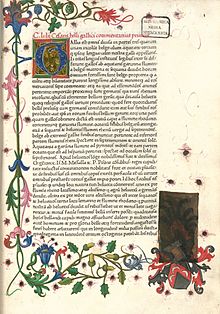Commentary on the Gallic Wars

First page of De bello Gallico, from a 1469 manuscript
|
|
| Author | Julius Caesar, Aulus Hirtius (VIII) |
|---|---|
| Language | Classical Latin |
| Subject | History, ethnography, military history |
| Publisher | Julius Caesar |
|
Publication date
|
58–49 BC |
| Followed by | Commentarii de Bello Civili |
Commentāriī dē Bellō Gallicō (English: Commentaries on the Gallic War), also Bellum Gallicum (English: Gallic War), is Julius Caesar's firsthand account of the Gallic Wars, written as a third-person narrative. In it Caesar describes the battles and intrigues that took place in the nine years he spent fighting the Germanic peoples and Celtic peoples in Gaul that opposed Roman conquest.
The "Gaul" that Caesar refers to is ambiguous, as the term had various connotations in Roman writing and discourse during Caesar's time. Generally, Gaul included all of the regions that Romans had not conquered or administered or which were primarily inhabited by Celts; except for the Roman province of Gallia Narbonensis (modern-day Provence and Languedoc-Roussillon), which had already been conquered in Caesar's time, therefore encompassing the rest of modern France, Belgium, Western Germany, and parts of Switzerland. As the Roman Republic made inroads deeper into Celtic territory and conquered more land, the definition of "Gaul" shifted. Concurrently, "Gaul" was also used in common parlance as a synonym for "uncouth" or "unsophisticated" as Romans saw Celtic peoples as uncivilized compared with Rome.
The work has been a mainstay in Latin instruction because of its simple, direct prose. It begins with the frequently quoted phrase "Gallia est omnis divisa in partes tres", meaning "Gaul is a whole divided into three parts". The full work is split into eight sections, Book 1 to Book 8, varying in size from approximately 5,000 to 15,000 words. Book 8 was written by Aulus Hirtius, after Caesar's death.
...
Wikipedia
